On March 9 Poland’s minister of foreign affairs, Radosław Sikorski, posted on X about an apparent threat by Elon Musk to deny Ukraine access to the Starlink satellite system it uses to guide its military drones. Musk, whose company SpaceX operates Starlink, had written that Ukraine’s “entire front line would collapse if I turned it off.” Sikorski noted that
Starlinks for Ukraine are paid for by the Polish Digitization Ministry at the cost of about $50 million per year. The ethics of threatening the victim of aggression apart, if SpaceX proves to be an unreliable provider we will be forced to look for other suppliers.
US secretary of state Marco Rubio weighed in to admonish Sikorski: “Say thank you because without Starlink Ukraine would have lost this war long ago and Russians would be on the border with Poland right now.” (He is presumably unaware that Poland already shares a border with Russia’s Kaliningrad exclave.) Musk posted his own reply to Sikorski: “Be quiet, small man.”
Such boorishness had by then ceased to be shocking. Imitation is the tawdriest form of flattery: Donald Trump’s courtiers signal their devotion by inflicting his mode of puerile bullying on allied governments. Rubio’s “Say thank you” was an obvious attempt to curry favor with Trump by emulating Vice President J.D. Vance’s haranguing of Ukrainian president Volodymyr Zelensky in the Oval Office on February 28: “Have you said thank you once?” Musk’s “small man” mimicked Trump’s familiar mode of insult—once aimed at “Little Marco” himself. The infantilization of America’s domestic politics has spread to its international relations. In Trump’s boys’ club, disdain for Europe is an important signifier of belonging: as Defense Secretary Pete Hegseth assured Vance in a Signal message of March 14, inadvertently leaked to The Atlantic’s Jeffrey Goldberg, “I fully share your loathing of European free-loading. It’s PATHETIC.”
What was nonetheless remarkable in this instance was the target. Poland is arguably the most pro-American foreign country on earth. In a Pew survey conducted in thirty-four countries across six continents last year, 86 percent of Poles said they held a favorable view of the US—higher than anywhere else, including Israel, the United Kingdom, and Japan. Trump’s demand that European members of NATO should spend more on defense has already been met by Poland—its military expenditure as a proportion of GDP is now more than twice as high as NATO’s official target of 2 percent and very close to the 5 percent that Trump proposed in January. Much of that outlay is on American arms and missile defense systems. In 2022 and 2023 Poland signed deals to buy more than $6 billion worth of Abrams tanks, and it has become the first European country to deploy them.
This love of America has deep roots in large-scale Polish immigration to the United States, in Woodrow Wilson’s support for the renaissance of an independent Polish state at the end of World War I, and in Ronald Reagan’s backing of the dissident Solidarity movement in the 1980s. The Polish sense of obligation helps explain the country’s steadfast political and military participation even in this century’s greatest American folly, George W. Bush’s invasion of Iraq in 2003. Though most Americans have probably forgotten this, after the fall of Saddam Hussein one of the four occupation zones into which Iraq was divided was under Polish control. Among other motives, this was Poland’s way of reciprocating a century of American friendship.
In Trump’s first term, it was he who was saying thank you to Poland. In July 2017 Trump addressed a large and audibly adoring crowd in Warsaw’s Krasiński Square:
We salute the Polish people for being one of the NATO countries that has actually achieved the benchmark for investment in our common defense. Thank you. Thank you, Poland. I must tell you, the example you set is truly magnificent, and we applaud Poland. Thank you.
Trump also assured the crowd that their country was at the heart of a transatlantic alliance for which he seemed to have boundless enthusiasm:
A strong Poland is a blessing to the nations of Europe, and they know that. A strong Europe is a blessing to the West and to the world. One hundred years after the entry of American forces into World War I, the transatlantic bond between the United States and Europe is as strong as ever and maybe, in many ways, even stronger.
How did we get from there to here? How did Trump’s fulsome praise for Poland as the best-behaved child in the European family transform into his sidekicks’ open contempt? How did Trump himself get from desire for “a strong Europe,” identification with “the West,” and commitment to “the transatlantic bond” to a historic sundering of that bond? Trump has shocked America’s European partners by betraying Ukraine and openly siding with Russia. There has been, as Poland’s prime minister, Donald Tusk, put it on March 7, a “profound change of American geopolitics,” and Europeans are having to come to terms with what it means for themselves and the world.
In trying to understand Trump, mere ignorance must always be given its due. His sense of grievance about NATO and the European Union is at once deep and vague. He thinks, as he told the London Times in January 2017, that the EU is just a German front: “You look at the European Union and it’s Germany. Basically a vehicle for Germany.” He seems to believe that NATO and the EU are effectively the same organization. John Bolton, who served as his national security adviser in 2018 and 2019, recalls in The Room Where It Happened: A White House Memoir:
Trump criticized Jean Claude Juncker [then president of the European Commission] as a vicious man who hated the United States desperately. Juncker, said Trump, sets the NATO budget, although he did not describe how that was accomplished.
More startlingly, Trump seems to confuse the percentage of GDP that NATO members spend on their own defense with what he persistently calls their “contributions” to NATO. Bolton recalls Trump threatening that the US would lower its “contributions” to the same level as Germany’s. He was referring to Germany’s failure to live up to its commitment to spend 2 percent of GDP on defense. But, as Bolton puzzled, this commitment
is not about “contributions” to NATO, but about aggregate defense spending. Whether Trump ever understood this, and simply misused the word “contribution,” I could never tell. But saying he would reduce the US “contribution” to Germany’s level implied the US would drop its defense expenditures from over 4 percent of GDP by some 75 percent, which I don’t think he meant.
Yet the haziness of Trump’s knowledge of Europe and of the transatlantic alliance offers a false comfort—if Trump doesn’t really know what he’s doing, he may just as easily stumble back into the arms of “the West.” While Trump’s grasp on reality may be unsteady, he has fixed ideas and unchanging instincts. It is those obsessions and impulses that are now reshaping relations between Europe and the US more dramatically than at any time since the end of World War II.
It should be acknowledged that the underlying tensions in those relations long predate Trump’s political ascendancy. While the cold war endured, Europe remained the primary locus of America’s confrontation with the Soviet Union, and US power provided Europe’s bulwark against a Soviet invasion. Paradoxically, however, the end of the cold war, which might have been expected to weaken US engagement with European security, actually deepened it. NATO has gradually doubled its membership from sixteen countries in 1990 to thirty-two now. The US thus accumulated commitments in principle to go to war with anyone who attacked Poland, Hungary, Bulgaria, the Baltic states, Albania, the Czech Republic, Slovakia, Slovenia, Romania, Croatia, Montenegro, even North Macedonia.
There is an underlying contradiction here: the threat receded, but American deterrence expanded. One might go so far as to say that NATO grew precisely because the threat it was intended to counter had apparently vanished—the US could make promises of protection to all and sundry because those assurances seemed increasingly abstract. Would Americans have committed themselves to defend North Macedonia if they believed there was the remotest possibility of its actually being invaded? A broad seam of fiction runs beneath the surface of this landscape. Europeans were, for the most part, happy to keep it buried and hope for the best. They were living, quite literally, with a false sense of security.
Equally, everyone in Europe knew that the US could go rogue. It did so in 2003 when it illegally invaded Iraq. The neoconservatives who dominated the Bush administration openly repudiated the idea that the US should be bound by international laws and institutions. Fundamental to this view is the belief, articulated most clearly by Robert Kagan in a seminal 2002 essay called “Power and Weakness,” that only puny nations have to subscribe to multilateral processes or norms. The Europeans love those organizations and conventions because they are weak. The US, as an exceptionally powerful force, has no need of them. This creed is entirely ahistorical—after victories in World Wars I and II and then again in the cold war, the extremely powerful US was actively involved in the creation of much of the nexus of global governance. But the intellectual and emotional grip of that idea is strong—not even Democratic presidents have sought, for example, to accept the jurisdiction of the International Criminal Court.
Neoconservatives embraced the idea of American global hegemony, even of America as an empire, but they tempered it with one crucial qualification: as Kagan and William Kristol put it in Foreign Affairs in 1996, “It is precisely because American foreign policy is infused with an unusually high degree of morality that other nations find they have less to fear from its otherwise daunting power.” This claim is innately absurd—the old European empires, particularly the British and the French, also presented themselves as moral missionaries rather than predatory conquerors. But even on its own terms, the claim depends entirely on the goodwill and decency of American presidents. It should not have taken Trump to disabuse Europeans of the notion that those presidents would always be essentially benevolent. But he has ripped away this cloak of morality. That fiction, too, has been exposed for what it is.
In these respects, Trump can be said to have forced Europeans into a belated confrontation with reality. In 2018, when Trump pulled out of the nuclear deal that the US and the EU had jointly made with Iran, Tusk, who was then president of the EU’s council, tweeted, “Looking at latest decisions of @realDonaldTrump someone could even think: with friends like that who needs enemies. But frankly, EU should be grateful. Thanks to him we got rid of all illusions.” Yet some illusions die hard, and the arrival in the Oval Office of the old Atlanticist Joe Biden resuscitated the fantasy of the ever-stronger “transatlantic bond.”
If Trump did no more than walk away—as he often threatened to do in his first term—from America’s commitments to Europe, he could even claim to have delivered a salutary dose of shock treatment. But he is not walking away from Europe; he is trampling all over it. His regime has not lost interest in Europe; it has developed a malevolent interest in destroying the EU.
Trump’s antipathy toward Europe’s institutions is not just one of his whims. It is intertwined with another part of his mentality: distorted ideas of masculinity. At least since 2003 and the American right’s furious reaction to French and German criticism of the invasion of Iraq, antagonism toward Europe has been shaped by a highly sexualized binary opposition of American masculine potency to European feminine feebleness. Kagan, in “Power and Weakness,” wrote that “Americans are from Mars and Europeans are from Venus”—echoing the title of John Gray’s best-selling book Men Are from Mars, Women Are from Venus. In 2003 in these pages, Timothy Garton Ash noted a reliance by American anti-Europeans on similar stereotypes:
The American is a virile, heterosexual male; the European is female, impotent, or castrated. Militarily, Europeans can’t get it up. (After all, they have fewer than twenty “heavy lift” transport planes, compared with the United States’ more than two hundred.)… The word “eunuchs” is, I discovered, used in the form “EU-nuchs.”*
It should be no surprise that Trump, Musk, and Vance view Europe through this same lens, as emasculated and therefore easily bullied.
Yet as is the way of fragile hypermasculinity, there is also the ultimate fear: How humiliating is it to be screwed by those whom you are destined to screw? Europeans were shocked in late February when Trump declared that “the European Union was formed in order to screw the United States. That’s the purpose of it, and they’ve done a good job of it.” He was merely repeating what he has said before. In 2020 Bob Woodward reported in his book Rage on a conversation with Trump: “The president brought up the European Union, which he felt had also been ‘ripping us off for years’ and been ‘formed to screw the United States.’”
In this darkly masochistic fantasy, the EU is no less threatening than China. Bolton recalls that, in a meeting with German chancellor Angela Merkel, “Trump also used a line I later heard countless times, that ‘the EU is worse than China except smaller,’ adding that the EU was set up to take advantage of the US.” In an interview on Fox News in July 2018, Trump said something similar. Maria Bartiromo asked him, “Would it be better to actually have our allies together to go against China instead of pushing back on our allies?” Trump replied, “Excuse me—the European Union is possibly as bad as China, just smaller. OK? It’s terrible what they do to us.” Thus swaggering virility morphs into a Victorian melodrama of feminine vulnerability—America is the naif taken advantage of by a predatory EU that has had its wicked way with her.
This anxiety goes so deep that when Trump has to list America’s enemies, it is the EU that first comes to mind. In 2018, before traveling to an infamously sycophantic summit with Vladimir Putin in Helsinki, Trump was asked by CBS News to name his “biggest foe globally right now.” “Well,” he said, “I think we have a lot of foes. I think the European Union is a foe, what they do to us in trade. Now you wouldn’t think of the European Union, but they’re a foe.” As so often with Trump, it is hard to distinguish petty personal grievances from epoch-making political decisions. In the 2017 interview with the London Times, he claimed that the EU had prevented him from developing his golf course in Ireland:
I own a big property in Ireland, magnificent property called Doonbeg, what happened is I went for an approval to do this massive, beautiful expansion…but I learnt a lot because I got the approvals very quickly from Ireland and then Ireland and my people went to the EU to get the approval—it was going to take years—that was a very bad thing for Ireland….
I found it to be a very unpleasant experience.
This isn’t what happened, but in Trump’s mind there is little distinction between real and perceived slights. And this imaginary unpleasantness still weighs on him—in a press conference with the Irish taoiseach, Micheál Martin, in the White House on March 12, he spent two minutes repeating his tale of woe about the EU and Doonbeg.
Politically, Trump’s hostility toward the EU first manifested in his enthusiastic support for Brexit. During his 2016 campaign he was anxious to identify himself personally with Britain’s decision to leave the EU. “Many people,” he tweeted just after the British referendum of June 23 that year, “are equating BREXIT, and what is going on in Great Britain, with what is happening in the US. People want their country back!” In August he doubled down: “They will soon be calling me MR. BREXIT!” At that time right-wingers in both Europe and the US hoped that Brexit was a harbinger of the collapse of the EU itself. Trump expressed this in the Times interview: “I think people want, people want their own identity, so if you ask me, others, I believe others will leave.”
In Trump’s first term his belief that the EU is a “foe” on a par with China (and far below Russia) bubbled up from time to time but largely remained latent. It could even—as in his Warsaw speech—be completely buried under Atlanticist boilerplate. But with Trump, nothing goes away. In his second term, his anti-Europeanism is not merely free from restraint by remnants of the old military and foreign policy establishments—it is egged on by those around him.
To answer the question of what happened to turn Trump’s lavish praise for Poland in 2017 into his henchmen’s supercilious sneering of 2025: three things have changed. They are Trump’s impeachment in 2019 over his attempted shakedown of Zelensky (as well as the Mueller report earlier that year into Russia’s interference in the 2016 US election); a much more aggressive desire to interfere in European domestic politics in support of far-right and neofascist parties; and Trump’s new alliance with Big Tech.
Trump’s admiration for Putin may be of long standing, but by his own account he now sees the Russian president as a brother-in-arms with whom he fought side by side against common enemies. “Putin went through a hell of a lot with me,” he said on February 28. “He went through a phony witch hunt where they used him and Russia. Russia, Russia, Russia, ever hear of that deal?” On the principle that my friend’s enemy is my enemy too, Poland (for obvious reasons one of the European countries most fearful of Russia) is cherished no longer. Ironically, the same military buildup that made Poland a darling for Trump in 2017 now makes it an unwelcome obstacle to Putin’s revived imperialism.
Secondly, Poland made the mistake of ditching a hard-right Catholic nationalist government (which was in office during Trump’s visit in 2017) for Tusk’s centrist coalition. The new Trump administration, far from disengaging from Europe, is much more interested in reshaping it in its own image. Musk and Vance are openly interfering in European democracies to support far-right nationalist parties and to undermine the EU from within. In a speech at the Munich Security Conference on February 14, Vance acted out a pretend slip of the tongue: “I look to Brussels, where EU commiss—commissars…” This flip from “commissioners” to “commissars” gave oily utterance to a message that cannot yet be fully articulated: the transfer of American enmity from Russia to the present equivalent of the Communist menace—the EU. Somewhat more subtly, Vance quoted Pope John Paul II: “Do not be afraid.” The Polish pope used this phrase at his inauguration in 1978, and it was understood at the time to be a challenge to Soviet hegemony over his homeland. Vance was again twisting words to substitute one tyrannical regime for another: the EU as the new Soviet Union.
Trump and his allies have clearly decided that the best way to destroy this new enemy is to subvert it by throwing America’s weight behind far-right movements within its member states. On the day of his speech in Munich, and just nine days before Germany’s federal election, Vance held a meeting at his hotel with Alice Weidel, leader of the far-right Alternative für Deutschland party, whose very name references a Nazi slogan (“Alles für Deutschland”). Meanwhile he refused to meet with Germany’s elected chancellor, Olaf Scholz. In his speech he called for an end to the so-called firewall, the refusal of Germany’s democratic parties to make deals with the AfD: “There’s no room for firewalls.” The instruction was clear: not only should Germans “not be afraid” to vote for the AfD, but the far right should be invited into government after the election.
This open subversion of the EU is closely related to the third big change: Trump’s partnership with the American tech and social media giants. Much of Vance’s speech in Munich was made up of lies about and wild exaggerations of European attempts to protect democracy and social freedoms from disinformation and abuse. In another world, his claims would be risible: that Scotland has threatened to prosecute people for “even private prayer within their own homes,” that the EU supported the annulling of elections in Romania and might do the same in Germany, that the EU intends to shut down social media “the moment they spot what they’ve judged to be, quote, ‘hateful content,’” and that German police “have carried out raids against citizens suspected of posting anti-feminist comments online.” None of these assertions is remotely true, but they all have a political point: the EU is a tyranny because it wants to impose some regulation on America’s social media companies. The commercial interest of those companies in being allowed to disseminate toxic material dovetails perfectly with the Trump administration’s interest in supporting the far-right and pro-Russian movements that spread hatred and disinformation.
What, though, will all of this achieve? The administration’s assault on the EU is clumsily counterproductive. This time Trump really has “got rid of all illusions” in Europe about America’s intentions. Whatever happens in Ukraine and however changeable Trump’s whims prove to be, the designation of the EU as an enemy power has created an irreversible logic. It is not just that Europe can no longer assume that the US is benign—it must reckon with the possibility that it will be actively malign. By so openly seeking to destroy the EU, Trump is forcing it to prove that what does not kill it will make it stronger.
The misogynistic imagery essential to the anti-European mentality of the American right is not marginal to this miscalculation. It supports the default assumption that the EU, being effeminate, is innately weak and that it will break under pressure from manly America. But the world does not conform to such idiotic prejudices. The EU has all the problems of a complex, rules-based, and highly consensual multilateral organization. Yet it is also inherently dynamic, growing as it has from a small club of six Western nations to a conglomeration of twenty-seven countries with a combined population much larger than that of the US.
There is an obvious precedent for Trump getting Europe wrong. Instead of being a harbinger of doom for the EU, his beloved Brexit is such an obvious mess that it has had the effect of consolidating the EU; even the far-right parties in France and Italy that flirted with Frexit and Italexit no longer do so. It is amusing that the notorious Project 2025 agenda for the second Trump administration laments that “in the wake of Brexit, EU foreign policy now takes place without UK input, which disadvantages the United States, given that the UK has historically been aligned with many US positions.” Almost a decade on from Brexit, the current, much more concerted attempt to undermine the EU will have far greater repercussions for the US.
Those consequences were immediately apparent in the response of the incoming German chancellor, Friedrich Merz, to Trump’s betrayal of Ukraine and open alliance with Putin: “My absolute priority will be to strengthen Europe as quickly as possible so that, step by step, we can really achieve independence from the USA.” He warned that those who put “America First” risk making their motto “America Alone.” Merz is a conservative and is—or was until last month—an Atlanticist. But he knows, as almost all European leaders do, that the postwar period of European history has now definitively ended.
In the short term the effective withdrawal of American security leaves the EU’s eastern flank (especially the small Baltic states) dangerously vulnerable to Putin’s aggression, and the trade war that Trump seems determined to start will weaken both the American and the European economies. Yet in Europe’s reaction to those threats, the future shape of its independence is already becoming discernible. Britain will move back toward Europe. EU countries will rapidly increase their spending on armaments—but they will also ensure that those weapons are made in Europe rather than America. The EU as a whole will borrow large amounts of money to fund collective military spending—the European Commission has already decided to raise up to €150 billion to boost the EU’s defense industries.
This in turn has potentially profound long-term economic implications. As Gideon Rachman has suggested in the Financial Times:
The issuance of common European debt is not just a way of raising money for defence. It also offers the chance to build up the euro as an alternative to the dollar as a global reserve currency. The capriciousness of the Trump administration means that there is a considerable global appetite for an alternative to US Treasuries as a safe asset.
Trump and his circle are taking a huge gamble—that they can bring down the EU and replace it with a refurbished Russian sphere of domination in the East and a patchwork of authoritarian nationalist states in Western and Central Europe. It is far more likely that they are creating a more unified and independent EU over which America will have increasingly diminished influence. America Alone will find that isolation is not so splendid.
—March 26, 2025


















 English (US) ·
English (US) ·